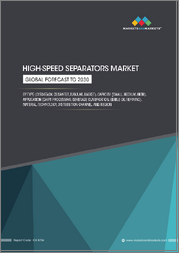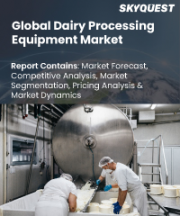
|
시장보고서
상품코드
1525993
공기 오일 분리기 시장 : 세계 산업 분석, 규모, 점유율, 성장, 동향, 예측(2024-2031년)Air Oil Separator Market: Global Industry Analysis, Size, Share, Growth, Trends, and Forecast, 2024 - 2031 |
||||||
Persistence Market Research는 최근 세계 공기 오일 분리기 시장에 대한 종합적인 보고서를 발표했습니다. 이 보고서는 시장 동인, 동향, 기회 및 과제를 포함한 주요 시장 역학을 철저히 평가하고 시장 구조에 대한 심층적인 인사이트를 제공합니다.
주요 인사이트
- 공기 오일 분리기 시장 규모(2024년) : 25억 달러
- 예상 시장 가치(2031년) : 35억 달러
- 세계 시장 성장률(2024-2031년 CAGR) : 5.3%
공기 오일 분리기 시장 - 보고서 범위:
공기 오일 분리기는 압축 공기 및 가스에서 오일 오염 물질을 제거하기 위해 다양한 산업 응용 분야에서 사용되는 중요한 구성요소입니다. 공기 품질을 유지하고 장비의 마모를 줄이며 효율적인 작동을 보장하는 데 중요한 역할을 합니다. 이 시장은 제조, 자동차, 항공우주, 에너지 및 기타 분야를 대상으로 원심분리, 합체분리, 막분리 등 다양한 유형의 분리기를 제공하고 있습니다. 시장 성장의 원동력은 산업 활동의 증가, 엄격한 배출가스 규제, 분리 기술의 기술 발전입니다.
시장 성장 촉진요인:
세계 공기 오일 분리기 시장은 산업화의 발전, 규제 표준을 충족하기 위한 효율적인 공기 여과 시스템의 필요성 등 몇 가지 중요한 요인에 의해 주도되고 있습니다. 자동차 제조, 항공우주, 발전 등의 분야에서 공기 오일 분리기 채택이 증가하면서 시장 수요가 증가하고 있습니다. 또한, 고효율 필터 및 친환경 소재 개발 등 분리기 기술의 발전은 성능 향상과 채택 확대에 기여하고 있습니다. 신흥국들의 산업 기반 확대와 환경 부하를 줄이기 위한 노력은 시장 성장을 더욱 촉진하고 있습니다.
시장 억제요인:
유망한 성장 전망에도 불구하고, 공기 오일 분리기 시장은 높은 초기 비용과 유지보수 요구 사항과 관련된 도전에 직면해 있습니다. 공기 오일 분리기는 복잡하고 정기적인 유지보수가 필요하기 때문에 산업계에 상당한 운영 비용이 발생합니다. 또한, 원자재 가격 변동과 저비용 대체품의 가용성은 시장 확대에 걸림돌이 될 수 있습니다. 이러한 경제적 및 운영상의 문제를 해결하기 위해서는 비용 효율성과 신뢰성을 높이는 설계 및 제조 공정의 혁신이 필요합니다.
시장 기회:
공기 오일 분리기 시장은 기술 혁신과 산업 요구 사항의 진화로 인해 큰 성장 기회를 제공합니다. 첨단 여과 기술의 통합과 보다 효율적이고 컴팩트한 분리기의 시장 개발은 시장 기업들에게 제품 제공을 강화할 수 있는 기회를 제공합니다. 지속가능성에 대한 관심 증가와 녹색 기술 채택은 시장 성장의 새로운 길을 열 것입니다. 연구 개발에 대한 전략적 투자와 주요 기업과의 파트너십은 새로운 기회를 활용하고 경쟁 우위를 유지하는 데 필수적입니다.
본 보고서에서 다루는 주요 질문들
- 세계 공기 오일 분리기 시장의 성장을 촉진하는 주요 요인은 무엇인가?
- 다양한 분야에서 공기 오일 분리기의 채택을 촉진하는 분리기의 종류와 산업 응용 분야는 무엇인가?
- 기술 발전은 어떻게 공기 오일 분리기 시장의 경쟁 상황을 어떻게 변화시키고 있는가?
- 공기 오일 분리기 시장에 기여하는 주요 기업은 누구이며, 시장 관련성을 유지하기 위해 어떤 전략을 채택하고 있는가?
- 세계 공기 오일 분리기 시장의 새로운 트렌드와 미래는?
목차
제1장 주요 요약
제2장 시장 개요
- 시장 범위/분류
- 시장 정의/범위/제한
제3장 주요 시장 동향
- 시장에 영향을 미치는 주요 동향
- 제품 혁신/개발 동향
제4장 핵심성공요인
- 제품 채용/사용 상황 분석
- 제품 USP/특징
- 전략적 프로모션 전략
제5장 세계 시장 수요, 분석(2019-2023년) 및 예측(2024-2031년)
- 과거 시장 규모(단위) 분석, 2019-2023년
- 현재 및 향후 시장 규모(유닛) 예측, 2024-2031년
- 전년비 성장 동향 분석
제6장 세계 시장 - 가격 분석
- 지역별 가격 분석
- 세계 평균 가격 분석 벤치마크
제7장 세계 시장 수요, 분석(2019-2023년) 및 예측(2024-2031년)
- 과거 시장 금액(10억 달러) 분석, 2019-2023년
- 현재 및 향후 시장 금액(10억 달러) 예측, 2024-2031년
- 전년비 성장 동향 분석
- 절대적 수익 기회
제8장 시장 배경
- 거시경제 요인
- 예측요인 - 관련성과 영향
- 밸류체인
- COVID-19 위기-영향 평가
- 시장 역학
제9장 세계 시장 분석(2019-2023년) 및 예측(2024-2031년) : 용도별
- 소개/주요 조사 결과
- 과거 시장 규모(10억 달러)와 수량 분석 : 용도별, 2019-2023년
- 현재 및 향후 시장 규모(10억 달러)와 수량 예측, 용도별, 2024-2031년
- 오일 윤활식 컴프레서
- 오일 윤활식 진공 펌프
- 시장 매력 분석 : 용도별
제10장 세계 시장 분석(2019-2023년) 및 예측(2024-2031년) : 판매 채널별
- 소개/주요 조사 결과
- 과거 시장 규모(10억 달러)와 수량 분석 : 판매 채널별, 2019-2023년
- 현재 및 향후 시장 규모(10억 달러)와 수량 예측, 판매 채널별, 2024-2031년
- OEM
- 애프터마켓
- 시장 매력 분석 : 판매 채널별
제11장 세계 시장 분석(2019-2023년) 및 예측(2024-2031년) : 최종 이용 산업별
- 소개/주요 조사 결과
- 과거 시장 규모(10억 달러)와 수량 분석 : 최종 이용 산업별, 2019-2023년
- 현재 및 향후 시장 규모(10억 달러)와 수량 예측, 최종 이용 산업별, 2024-2031년
- 화학 산업
- 식품·음료 업계
- HVAC와 냉장
- 의료 및 연구
- 일반 제조업
- 시장 매력 분석 : 최종 이용 산업별
제12장 세계 시장 분석(2019-2023년) 및 예측(2024-2031년) : 지역별
- 소개
- 과거 시장 규모(10억 달러)와 수량 분석 : 지역별, 2019-2023년
- 현재 및 향후 시장 규모(10억 달러)와 수량 예측, 지역별, 2024-2031년
- 북미
- 라틴아메리카
- 유럽
- 동아시아
- 남아시아 및 태평양
- 중동 및 아프리카
- 시장 매력 분석 : 지역별
제13장 북미 시장 분석(2019-2023년) 및 예측(2024-2031년)
제14장 라틴아메리카 시장 분석(2019-2023년) 및 예측(2024-2031년)
제15장 유럽 시장 분석(2019-2023년) 및 예측(2024-2031년)
제16장 동아시아 시장 분석(2019-2023년) 및 예측(2024-2031년)
제17장 남아시아 및 태평양 시장 분석(2019-2023년) 및 예측(2024-2031년)
제18장 중동 및 아프리카 시장 분석(2019-2023년) 및 예측(2024-2031년)
제19장 국가별 시장 분석 2024-2031년
- 소개
- 미국 시장 분석
- 캐나다 시장 분석
- 멕시코 시장 분석
- 브라질 시장 분석
- 독일 시장 분석
- 이탈리아 시장 분석
- 프랑스 시장 분석
- 영국 시장 분석
- 스페인 시장 분석
- 베네룩스 시장 분석
- 러시아 시장 분석
- 중국 시장 분석
- 일본 시장 분석
- 한국 시장 분석
- ASEAN 시장 분석
- 호주와 뉴질랜드의 시장 분석
- GCC 국가의 시장 분석
- 터키 시장 분석
- 북아프리카 시장 분석
- 남아프리카공화국 시장 분석
제20장 시장 구조 분석
- 기업 계층별 시장 분석(공기 오일 분리기)
- 주요 기업의 시장 점유율 분석
- 시장 입지 분석
제21장 경쟁 분석
- 경쟁 대시보드
- 경쟁 벤치마크
- 경쟁 상세
- Ingersoll Rand Inc
- MANN+HUMMEL
- Chicago Pneumatic
- TG Filter SRL
- Sofin Industrial Filters SRL
- FAI FILTRI SRL
- SOTRAS SRL
- KELTEC Technolab
- PSI Global Ltd.
- Dongguan Sheglian Filter Manufacturing
- XINXIANG ZHONGYUE FILTER CO., LTD.
- Atlas Copco
제22장 사용되는 가정과 두문자어
제23장 조사 방법
ksm 24.08.27Persistence Market Research has recently released a comprehensive report on the global air oil separator market. The report offers a thorough assessment of crucial market dynamics, including drivers, trends, opportunities, and challenges, providing detailed insights into the market structure.
Key Insights:
- Air Oil Separator Market Size (2024E): USD 2.5 Bn
- Projected Market Value (2031F): USD 3.5 Bn
- Global Market Growth Rate (CAGR 2024 to 2031): 5.3%
Air Oil Separator Market - Report Scope:
Air oil separators are critical components used in various industrial applications to remove oil contaminants from compressed air and other gases. They play a vital role in maintaining air quality, reducing equipment wear, and ensuring efficient operation. The market caters to sectors such as manufacturing, automotive, aerospace, and energy, offering a range of separator types, including centrifugal, coalescing, and membrane separators. Market growth is driven by increasing industrial activities, stringent regulations on emissions, and technological advancements in separation technologies.
Market Growth Drivers:
The global air oil separator market is driven by several key factors, including the growing industrialization and the need for efficient air filtration systems to meet regulatory standards. The rising adoption of air oil separators in sectors such as automotive manufacturing, aerospace, and power generation is boosting market demand. Additionally, advancements in separator technology, such as the development of high-efficiency filters and eco-friendly materials, contribute to improved performance and increased adoption. The expanding industrial base in emerging economies and the focus on reducing environmental impact further drive market growth.
Market Restraints:
Despite promising growth prospects, the air oil separator market faces challenges related to high initial costs and maintenance requirements. The complexity of air oil separators and the need for regular servicing can impose significant operational expenses on industries. Additionally, fluctuating prices of raw materials and the availability of low-cost alternatives may hinder market expansion. Addressing these economic and operational challenges requires innovations in design and manufacturing processes to enhance cost-effectiveness and reliability.
Market Opportunities:
The air oil separator market presents significant growth opportunities driven by technological innovations and evolving industrial requirements. The integration of advanced filtration technologies and the development of more efficient and compact separators offer opportunities for market players to enhance product offerings. The increasing focus on sustainability and the adoption of green technologies create new avenues for market growth. Strategic investments in research and development, coupled with partnerships with key industrial players, are essential to capitalize on emerging opportunities and maintain competitive advantage.
Key Questions Answered in the Report:
- What are the primary factors driving the growth of the air oil separator market globally?
- Which separator types and industrial applications are driving air oil separator adoption across different sectors?
- How are technological advancements reshaping the competitive landscape of the air oil separator market?
- Who are the key players contributing to the air oil separator market, and what strategies are they employing to maintain market relevance?
- What are the emerging trends and future prospects in the global air oil separator market?
Competitive Intelligence and Business Strategy:
Leading players in the global air oil separator market, including Parker Hannifin Corporation, Donaldson Company, Inc., and Atlas Copco, focus on innovation, product differentiation, and strategic partnerships to gain a competitive edge. These companies invest in R&D to develop advanced separator technologies, including high-efficiency and eco-friendly solutions, catering to diverse industrial needs. Collaborations with end-users, industrial suppliers, and regulatory bodies facilitate market access and promote technology adoption. Moreover, emphasis on product performance, reliability, and cost-effectiveness enhances market growth and strengthens industry position.
Key Companies Profiled:
- Atlas Copco
- Chicago Pneumatic
- Donaldson Companny Inc
- Walker Filtration Inc
- MANN+HUMMEL
- Sotras Srl
- Ingersoll Rand Inc
- FAI Filtri Srl
- T.G. Filter Srl
Global Air Oil Separator Market by Category
By Product Type
- Pleated
- Coalescing
- Deep Filter
By Application
- Oil Lubricated Compressors
- Oil Lubricated Vacuum Pumps
By End Use
- Oil & Gas
- Power Generation
- Automotive
- Aerospace
- Food and Beverage
- Chemical
- Other Industrial
By Region
- North America
- Europe
- East Asia
- South Asia & Oceania
- Latin America
- Middle East & Africa
Table of Contents
1. Executive Summary
- 1.1. Global Market Outlook
- 1.2. Demand Side Trends
- 1.3. Supply Side Trends
- 1.4. Technology Roadmap
- 1.5. Analysis and Recommendations
2. Market Overview
- 2.1. Market Coverage / Taxonomy
- 2.2. Market Definition / Scope / Limitations
3. Key Market Trends
- 3.1. Key Trends Impacting the Market
- 3.2. Product Innovation / Development Trends
4. Key Success Factors
- 4.1. Product Adoption / Usage Analysis
- 4.2. Product USPs / Features
- 4.3. Strategic Promotional Strategies
5. Global Market Demand Analysis 2019-2023 and Forecast, 2024 - 2031
- 5.1. Historical Market Volume (units) Analysis, 2019-2023
- 5.2. Current and Future Market Volume ('Units) Projections, 2024 - 2031
- 5.3. Y-o-Y Growth Trend Analysis
6. Global Market - Pricing Analysis
- 6.1. Regional Pricing Analysis
- 6.2. Global Average Pricing Analysis Benchmark
7. Global Market Demand (in Value or Size in US$ Bn ) Analysis 2019-2023 and Forecast, 2024 - 2031
- 7.1. Historical Market Value (US$ Bn ) Analysis, 2019-2023
- 7.2. Current and Future Market Value (US$ Bn ) Projections, 2024 - 2031
- 7.2.1. Y-o-Y Growth Trend Analysis
- 7.2.2. Absolute $ Opportunity Analysis
8. Market Background
- 8.1. Macro-Economic Factors
- 8.1.1. Global GDP Growth Outlook
- 8.1.2. Global Manufacturing Industry Overview
- 8.1.3. Global chemical Industry Overview
- 8.1.4. Other Macro Economic Factors
- 8.2. Forecast Factors - Relevance & Impact
- 8.2.1. Top Companies Historical Growth
- 8.2.2. GDP Growth forecast
- 8.2.3. Global Infrastructure Growth Outlook
- 8.2.4. Global Urbanization Growth Outlook
- 8.2.5. Business Climate
- 8.3. Value Chain
- 8.3.1. Raw Material Suppliers
- 8.3.2. Product Manufacturers
- 8.3.3. List of key Technologies
- 8.3.4. Key Regulations
- 8.4. COVID-19 Crisis - Impact Assessment
- 8.4.1. Current Statistics
- 8.4.2. Short-Mid-Long Term Outlook
- 8.4.3. Likely Rebound
- 8.5. Market Dynamics
- 8.5.1. Drivers
- 8.5.2. Restraints
- 8.5.3. Opportunity Analysis
9. Global Market Analysis 2019-2023 and Forecast 2024 - 2031, By Application
- 9.1. Introduction / Key Findings
- 9.2. Historical Market Size (US$ Bn ) and Volume Analysis By Application, 2019-2023
- 9.3. Current and Future Market Size (US$ Bn ) and Volume Analysis and Forecast By Application, 2024 - 2031
- 9.3.1. Oil Lubricated Compressors
- 9.3.2. Oil Lubricated Vacuum Pumps
- 9.4. Market Attractiveness Analysis By Application
10. Global Market Analysis 2019-2023 and Forecast 2024 - 2031, By Sales Channel
- 10.1. Introduction / Key Findings
- 10.2. Historical Market Size (US$ Bn ) and Volume Analysis By Sales Channel, 2019-2023
- 10.3. Current and Future Market Size (US$ Bn ) and Volume Analysis and Forecast By Sales Channel, 2024 - 2031
- 10.3.1. OEMs
- 10.3.2. Aftermarket
- 10.4. Market Attractiveness Analysis By Sales Channel
11. Global Market Analysis 2019-2023 and Forecast 2024 - 2031, by End-Use Industry
- 11.1. Introduction / Key Findings
- 11.2. Historical Market Size (US$ Bn ) and Volume Analysis By End-Use Industry, 2019-2023
- 11.3. Current and Future Market Size (US$ Bn ) and Volume Analysis and Forecast By End-Use Industry, 2024 - 2031
- 11.3.1. Chemical Industry
- 11.3.2. Food and Beverage Industry
- 11.3.3. HVAC and Refrigeration
- 11.3.4. Medical and Laboratory
- 11.3.5. General Manufacturing
- 11.4. Market Attractiveness Analysis By End-Use Industry
12. Global Market Analysis 2019-2023 and Forecast 2024 - 2031, by Region
- 12.1. Introduction
- 12.2. Historical Market Size (US$ Bn ) and Volume Analysis By Region, 2019-2023
- 12.3. Current Market Size (US$ Bn ) and Volume Analysis and Forecast By Region, 2024 - 2031
- 12.3.1. North America
- 12.3.2. Latin America
- 12.3.3. Europe
- 12.3.4. East Asia
- 12.3.5. South Asia and Pacific
- 12.3.6. Middle East and Africa
- 12.4. Market Attractiveness Analysis By Region
13. North America Market Analysis 2019-2023 and Forecast 2024 - 2031
- 13.1. Introduction
- 13.2. Pricing Analysis
- 13.3. Historical Market Size (US$ Bn ) and Volume Trend Analysis By Market Taxonomy, 2019-2023
- 13.4. Market Size (US$ Bn ) and Volume Forecast By Market Taxonomy, 2024 - 2031
- 13.4.1. By Country
- 13.4.1.1. U.S.
- 13.4.1.2. Canada
- 13.4.2. By Application
- 13.4.3. By Sales Channel
- 13.4.4. By End-Use Industry
- 13.4.1. By Country
- 13.5. Market Attractiveness Analysis
- 13.5.1. By Country
- 13.5.2. By Application
- 13.5.3. By Sales Channel
- 13.5.4. By End-Use Industry
- 13.6. Market Trends
- 13.7. Key Market Participants - Intensity Mapping
- 13.8. Drivers and Restraints - Impact Analysis
14. Latin America Market Analysis 2019-2023 and Forecast 2024 - 2031
- 14.1. Introduction
- 14.2. Pricing Analysis
- 14.3. Historical Market Size (US$ Bn ) and Volume Trend Analysis By Market Taxonomy, 2019-2023
- 14.4. Market Size (US$ Bn ) and Volume Forecast By Market Taxonomy, 2024 - 2031
- 14.4.1. By Country
- 14.4.1.1. Brazil
- 14.4.1.2. Mexico
- 14.4.1.3. Rest of Latin America
- 14.4.2. By Application
- 14.4.3. By Sales Channel
- 14.4.4. By End-Use Industry
- 14.4.1. By Country
- 14.5. Market Attractiveness Analysis
- 14.5.1. By Country
- 14.5.2. By Application
- 14.5.3. By Sales Channel
- 14.5.4. By End-Use Industry
- 14.6. Market Trends
- 14.7. Key Market Participants - Intensity Mapping
- 14.8. Drivers and Restraints - Impact Analysis
15. Europe Market Analysis 2019-2023 and Forecast 2024 - 2031
- 15.1. Introduction
- 15.2. Pricing Analysis
- 15.3. Historical Market Size (US$ Bn ) and Volume Trend Analysis By Market Taxonomy, 2019-2023
- 15.4. Market Size (US$ Bn ) and Volume Forecast By Market Taxonomy, 2024 - 2031
- 15.4.1. By Country
- 15.4.1.1. Germany
- 15.4.1.2. Italy
- 15.4.1.3. France
- 15.4.1.4. U.K.
- 15.4.1.5. Spain
- 15.4.1.6. NORDICS
- 15.4.1.7. Russia
- 15.4.1.8. Rest of Europe
- 15.4.2. By Application
- 15.4.3. By Sales Channel
- 15.4.4. By End-Use Industry
- 15.4.1. By Country
- 15.5. Market Attractiveness Analysis
- 15.5.1. By Country
- 15.5.2. By Application
- 15.5.3. By Sales Channel
- 15.5.4. By End-Use Industry
- 15.6. Market Trends
- 15.7. Key Market Participants - Intensity Mapping
- 15.8. Drivers and Restraints - Impact Analysis
16. East Asia Market Analysis 2019-2023 and Forecast 2024 - 2031
- 16.1. Introduction
- 16.2. Pricing Analysis
- 16.3. Historical Market Size (US$ Bn ) and Volume Trend Analysis By Market Taxonomy, 2019-2023
- 16.4. Market Size (US$ Bn ) and Volume Forecast By Market Taxonomy, 2024 - 2031
- 16.4.1. By Country
- 16.4.1.1. China
- 16.4.1.2. Japan
- 16.4.1.3. South Korea
- 16.4.2. By Application
- 16.4.3. By Sales Channel
- 16.4.4. By End-Use Industry
- 16.4.1. By Country
- 16.5. Market Attractiveness Analysis
- 16.5.1. By Country
- 16.5.2. By Application
- 16.5.3. By Sales Channel
- 16.5.4. By End-Use Industry
- 16.6. Market Trends
- 16.7. Key Market Participants - Intensity Mapping
- 16.8. Drivers and Restraints - Impact Analysis
17. South Asia and Pacific Market Analysis 2019-2023 and Forecast 2024 - 2031
- 17.1. Introduction
- 17.2. Pricing Analysis
- 17.3. Historical Market Size (US$ Bn ) and Volume Trend Analysis By Market Taxonomy, 2019-2023
- 17.4. Market Size (US$ Bn ) and Volume Forecast By Market Taxonomy, 2024 - 2031
- 17.4.1. By Country
- 17.4.1.1. India
- 17.4.1.2. ASEAN
- 17.4.1.3. Oceania
- 17.4.1.4. Rest of South Asia & Pacific
- 17.4.2. By Application
- 17.4.3. By Sales Channel
- 17.4.4. By End-Use Industry
- 17.4.1. By Country
- 17.5. Market Attractiveness Analysis
- 17.5.1. By Country
- 17.5.2. By Application
- 17.5.3. By Sales Channel
- 17.5.4. By End-Use Industry
- 17.6. Market Trends
- 17.7. Key Market Participants - Intensity Mapping
- 17.8. Drivers and Restraints - Impact Analysis
18. Middle East and Africa Market Analysis 2019-2023 and Forecast 2024 - 2031
- 18.1. Introduction
- 18.2. Pricing Analysis
- 18.3. Historical Market Size (US$ Bn ) and Volume Trend Analysis By Market Taxonomy, 2019-2023
- 18.4. Market Size (US$ Bn ) and Volume Forecast By Market Taxonomy, 2024 - 2031
- 18.4.1. By Country
- 18.4.1.1. GCC Countries
- 18.4.1.2. Turkey
- 18.4.1.3. Northern Africa
- 18.4.1.4. South Africa
- 18.4.1.5. Rest of Middle East and Africa
- 18.4.2. By Application
- 18.4.3. By Sales Channel
- 18.4.4. By End-Use Industry
- 18.4.1. By Country
- 18.5. Market Attractiveness Analysis
- 18.5.1. By Country
- 18.5.2. By Application
- 18.5.3. By Sales Channel
- 18.5.4. By End-Use Industry
- 18.6. Market Trends
- 18.7. Key Market Participants - Intensity Mapping
- 18.8. Drivers and Restraints - Impact Analysis
19. Country Wise Market Analysis 2024 - 2031
- 19.1. Introduction
- 19.1.1. Market Value Proportion Analysis, By Key Countries
- 19.1.2. Global Vs. Country Growth Comparison
- 19.2. U.S. Market Analysis
- 19.2.1. By Application
- 19.2.2. By Sales Channel
- 19.2.3. By End-Use Industry
- 19.3. Canada Market Analysis
- 19.3.1. By Application
- 19.3.2. By Sales Channel
- 19.3.3. By End-Use Industry
- 19.4. Mexico Market Analysis
- 19.4.1. By Application
- 19.4.2. By Sales Channel
- 19.4.3. By End-Use Industry
- 19.5. Brazil Market Analysis
- 19.5.1. By Application
- 19.5.2. By Sales Channel
- 19.5.3. By End-Use Industry
- 19.6. Germany Market Analysis
- 19.6.1. By Application
- 19.6.2. By Sales Channel
- 19.6.3. By End-Use Industry
- 19.7. Italy Market Analysis
- 19.7.1. By Application
- 19.7.2. By Sales Channel
- 19.7.3. By End-Use Industry
- 19.8. France Market Analysis
- 19.8.1. By Application
- 19.8.2. By Sales Channel
- 19.8.3. By End-Use Industry
- 19.9. U.K. Market Analysis
- 19.9.1. By Application
- 19.9.2. By Sales Channel
- 19.9.3. By End-Use Industry
- 19.10. Spain Market Analysis
- 19.10.1. By Application
- 19.10.2. By Sales Channel
- 19.10.3. By End-Use Industry
- 19.11. BENELUX Market Analysis
- 19.11.1. By Application
- 19.11.2. By Sales Channel
- 19.11.3. By End-Use Industry
- 19.12. Russia Market Analysis
- 19.12.1. By Application
- 19.12.2. By Sales Channel
- 19.12.3. By End-Use Industry
- 19.13. China Market Analysis
- 19.13.1. By Application
- 19.13.2. By Sales Channel
- 19.13.3. By End-Use Industry
- 19.14. Japan Market Analysis
- 19.14.1. By Application
- 19.14.2. By Sales Channel
- 19.14.3. By End-Use Industry
- 19.15. S. Korea Market Analysis
- 19.15.1. By Application
- 19.15.2. By Sales Channel
- 19.15.3. By End-Use Industry
- 19.16. ASEAN Market Analysis
- 19.16.1. By Application
- 19.16.2. By Sales Channel
- 19.16.3. By End-Use Industry
- 19.17. Australia and New Zealand Market Analysis
- 19.17.1. By Application
- 19.17.2. By Sales Channel
- 19.17.3. By End-Use Industry
- 19.18. GCC Countries Market Analysis
- 19.18.1. By Application
- 19.18.2. By Sales Channel
- 19.18.3. By End-Use Industry
- 19.19. Turkey Market Analysis
- 19.19.1. By Application
- 19.19.2. By Sales Channel
- 19.19.3. By End-Use Industry
- 19.20. Northern Africa Market Analysis
- 19.20.1. By Application
- 19.20.2. By Sales Channel
- 19.20.3. By End-Use Industry
- 19.21. South Africa Market Analysis
- 19.21.1. By Application
- 19.21.2. By Sales Channel
- 19.21.3. By End-Use Industry
20. Market Structure Analysis
- 20.1. Market Analysis by Tier of Companies (Air Oil Separator)
- 20.2. Market Share Analysis of Top Players
- 20.3. Market Presence Analysis
21. Competition Analysis
- 21.1. Competition Dashboard
- 21.2. Competition Benchmarking
- 21.3. Competition Deep Dive
- 21.3.1. Ingersoll Rand Inc
- 21.3.1.1. Overview
- 21.3.1.2. Product Portfolio
- 21.3.1.3. Profitability by Market Segments (Product/Channel/Region)
- 21.3.1.4. Sales Footprint
- 21.3.1.5. Strategy Overview
- 21.3.2. MANN+HUMMEL
- 21.3.2.1. Overview
- 21.3.2.2. Product Portfolio
- 21.3.2.3. Profitability by Market Segments (Product/Channel/Region)
- 21.3.2.4. Sales Footprint
- 21.3.2.5. Strategy Overview
- 21.3.3. Chicago Pneumatic
- 21.3.3.1. Overview
- 21.3.3.2. Product Portfolio
- 21.3.3.3. Profitability by Market Segments (Product/Channel/Region)
- 21.3.3.4. Sales Footprint
- 21.3.3.5. Strategy Overview
- 21.3.4. T.G. Filter S.R.L
- 21.3.4.1. Overview
- 21.3.4.2. Product Portfolio
- 21.3.4.3. Profitability by Market Segments (Product/Channel/Region)
- 21.3.4.4. Sales Footprint
- 21.3.4.5. Strategy Overview
- 21.3.5. Sofin Industrial Filters S.R.L.
- 21.3.5.1. Overview
- 21.3.5.2. Product Portfolio
- 21.3.5.3. Profitability by Market Segments (Product/Channel/Region)
- 21.3.5.4. Sales Footprint
- 21.3.5.5. Strategy Overview
- 21.3.6. FAI FILTRI S.R.L.
- 21.3.6.1. Overview
- 21.3.6.2. Product Portfolio
- 21.3.6.3. Profitability by Market Segments (Product/Channel/Region)
- 21.3.6.4. Sales Footprint
- 21.3.6.5. Strategy Overview
- 21.3.7. SOTRAS S.R.L.
- 21.3.7.1. Overview
- 21.3.7.2. Product Portfolio
- 21.3.7.3. Profitability by Market Segments (Product/Channel/Region)
- 21.3.7.4. Sales Footprint
- 21.3.7.5. Strategy Overview
- 21.3.8. KELTEC Technolab
- 21.3.8.1. Overview
- 21.3.8.2. Product Portfolio
- 21.3.8.3. Profitability by Market Segments (Product/Channel/Region)
- 21.3.8.4. Sales Footprint
- 21.3.8.5. Strategy Overview
- 21.3.9. PSI Global Ltd.
- 21.3.9.1. Overview
- 21.3.9.2. Product Portfolio
- 21.3.9.3. Profitability by Market Segments (Product/Channel/Region)
- 21.3.9.4. Sales Footprint
- 21.3.9.5. Strategy Overview
- 21.3.10. Dongguan Sheglian Filter Manufacturing
- 21.3.10.1. Overview
- 21.3.10.2. Product Portfolio
- 21.3.10.3. Profitability by Market Segments (Product/Channel/Region)
- 21.3.10.4. Sales Footprint
- 21.3.10.5. Strategy Overview
- 21.3.11. XINXIANG ZHONGYUE FILTER CO., LTD.
- 21.3.11.1. Overview
- 21.3.11.2. Product Portfolio
- 21.3.11.3. Profitability by Market Segments (Product/Channel/Region)
- 21.3.11.4. Sales Footprint
- 21.3.11.5. Strategy Overview
- 21.3.12. Atlas Copco
- 21.3.12.1. Overview
- 21.3.12.2. Product Portfolio
- 21.3.12.3. Profitability by Market Segments (Product/Channel/Region)
- 21.3.12.4. Sales Footprint
- 21.3.12.5. Strategy Overview
- 21.3.1. Ingersoll Rand Inc



















